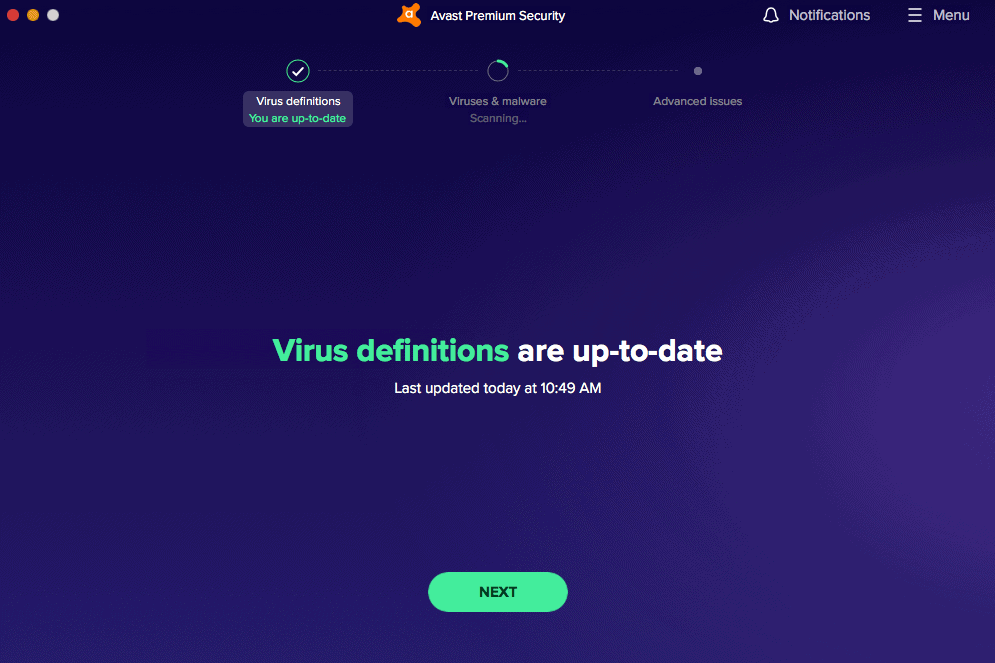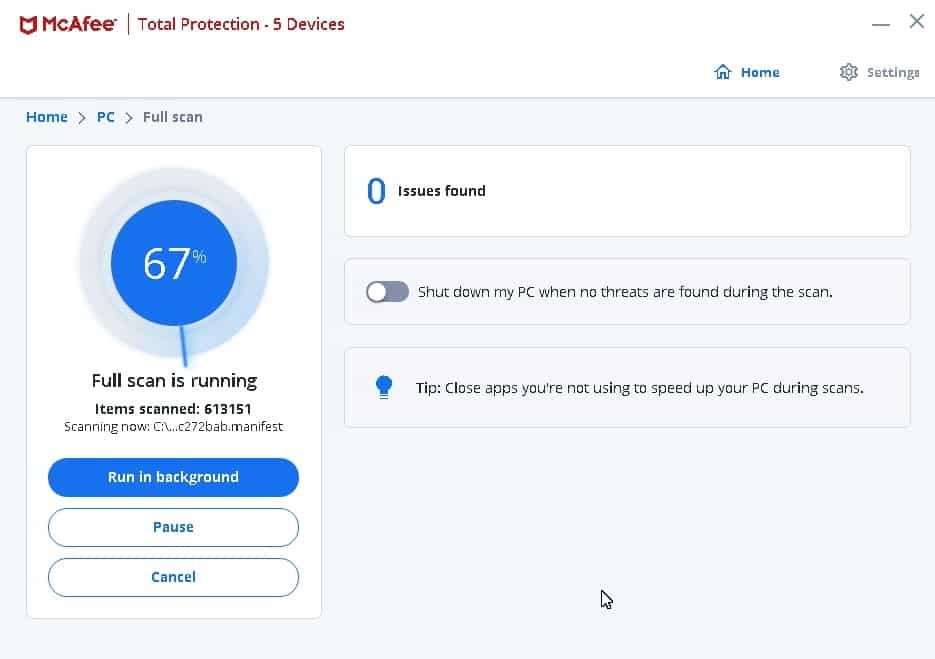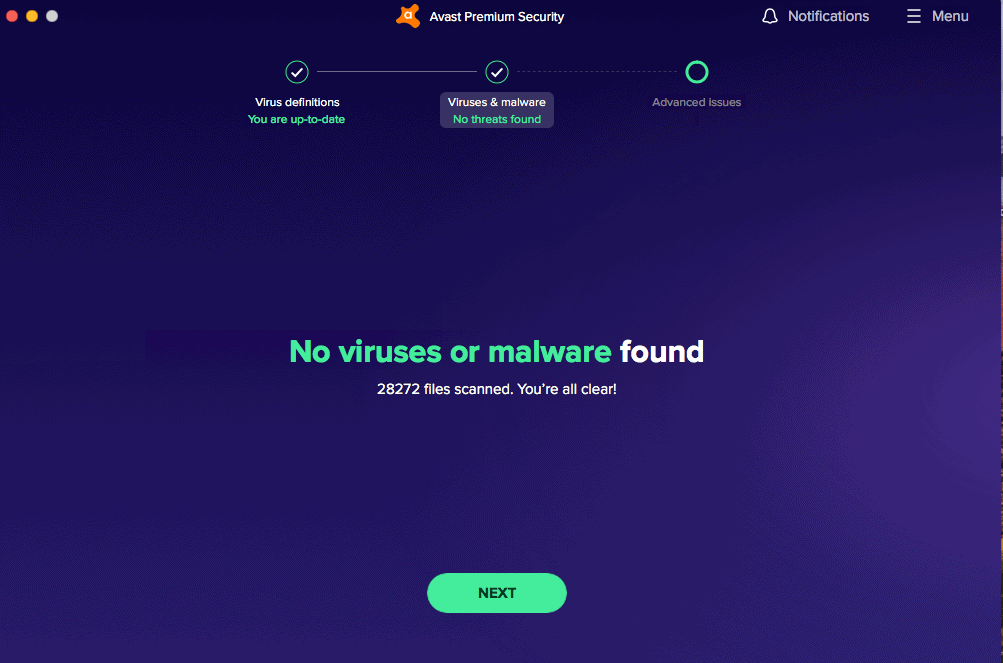Antiviruses have existed for almost as long as the internet has, and from the very beginning, they have always been a necessity. As the internet prospered, the importance of malware protection only became more pronounced. But what exactly does antivirus software do? And how do we choose the right antivirus software to use?
In this guide, our experts will explain everything you need to know about antivirus software, as well as the nitty-gritty of how to choose one. We’ll also give you a glimpse of our testing process and an overview of antivirus pricing to help you get started. Keep reading to learn more.
What Is Antivirus Protection?
In a nutshell, antivirus software preventatively detects, neutralizes, and then gets rid of malware. Most antivirus do that by scanning devices and comparing files with regularly updated databases of malware and viruses. However, modern antivirus solutions can also detect suspicious behaviors of files and programs to detect potential malware that is not yet in any databases.
No antivirus software is 100-percent accurate. That’s why it’s of utmost importance to choose a reliable antivirus. We have a list we update annually of the best antivirus software. These options provide the most up-to-date malware databases for more accurate malware protection.
Do You Need Antivirus Software?
One of the first questions people ask regarding antivirus software is if antivirus is still necessary on all devices. To that, we say ‘yes.’
It’s true that some operating systems are more resilient to malware, but antivirus software provides more than just malware detection. There are other valuable cybersecurity features that can help keep you safer both offline and online. For example, antivirus software can remove potentially unwanted programs to keep you digitally clean. Others prevent threats like ransomware and spyware. With cybercrime increasing by 33 percent last year, antivirus software is a necessity.1
For a closer look at why a specific platform needs antivirus protection, check out these guides:
Antivirus Software Features
Now that you have an idea of what antivirus protection is, let’s break down exactly how antivirus works and what it scans for.
What Does Antivirus Software Scan For?
Modern antivirus software operates on two fronts. There’s the continuous protection running 24/7 in the background and the manual or scheduled scans. Think of it as having both a 24/7 security system and the ability to call for a thorough inspection whenever you want. But what exactly are these antivirus programs looking for?
- Malware: Think of malware as the umbrella term for all the digital nasties out there. It covers everything including ransomware, computer worms, adware, trojan viruses, and spyware. These pieces of software sneak onto your device to steal your personal information for identity theft, or mess with your settings. Antivirus can stop those types of malware hackers in their tracks. Let’s break down each specific type:
- Spyware: This sneaky software infiltrates your device and quietly harvests sensitive data, like bank details, credit card numbers, passwords, you name it. One variant is keyloggers, which record keystrokes to steal credentials.
- Ransomware: Imagine coming home to find all your doors locked and a note demanding payment for the keys. That’s what ransomware does to your files. Hackers encrypt your files and demand payment (usually in cryptocurrency) to restore access.
- Adware: Adware hides on devices and shows the user advertisements as well as monitors their online behavior. This helps brands create targeted advertisements based on what the user searches for. Here are steps to remove adware, if need be.
Scams: The internet’s full of scammers. While antivirus can’t catch every scam, it’s pretty good at spotting the ones that use malicious websites or infected attachments. Here are two big ones to watch out for:
- Phishing: You know those “urgent” emails from your “bank” asking you to verify your account? That’s phishing in action. These fraudulent messages contain malicious attachments or links to fake websites designed to steal your downloads.2
- Pharming: While phishing requires you to take the bait, pharming is more insidious. It redirects you to fake websites automatically by corrupting your computer’s DNS settings or infecting the server itself. You could type in your bank’s correct URL and still end up on a fraudulent site.
- Spoofing: Spoofing happens when a person pretends to be someone else to get a user’s credentials so they can access their systems, steal information and spread malware. This can be done through email, websites, texts, GPS, and other methods. Note that antivirus software doesn’t monitor for the act of impersonation itself, but rather, the malware spoofers use to infect their victims’ computers.
- Remote access attacks: Next to last, remote access attacks are malicious actions that target either one or an entire network of computers. Rather than affecting the computers themselves, these attacks find the machine’s vulnerable points to view and steal data, introduce malware and viruses, and more.
- Viruses: Finally, a virus is any malicious code or program that attaches itself to legitimate files or programs and corrupts data, harming the software itself.
Note: Remote access attacks are also known as remote exploit attacks.
How Antivirus Software Prevents Cyber Threats
Now that you know everything to be concerned about when it comes to cyber threats, here’s exactly how antivirus software can stop them from happening in the first place.
- Reactive file scanning: Before you open any new file, antivirus software scans it against a database of known malware.
- Complete system scans: Beyond individual files, the software performs comprehensive device scans to uncover compromised data lurking anywhere on your system. Expect these deep dives to take more time than quick file checks.
- Web browsing protection: Your antivirus acts as a digital bouncer for your browser, screening URLs and web pages in real-time to block malicious sites before they can deploy their payloads.
- Real-time prevention: Modern antivirus operates like an always-on security system. It automatically monitors your activities and neutralizes threats the moment they appear.
- Rapid infection and threat removal: Detection is just half the battle. When antivirus software finds malware, it immediately isolates it in a secure quarantine zone. This prevents damage, giving you time to review and remove it manually.
How Antivirus Software Detects Cyber Threats
We know that antivirus software uses a database of malware to look out for your device, but just how does it detect threats?
- Behavior-based detection: This is where modern antivirus really earns its keep. Instead of just matching known signatures, it watches for suspicious activities—like a program trying to encrypt all your files (hello, ransomware) or software attempting system changes. This approach catches zero-day threats that haven’t made it into any database yet.
- Signature analysis: Signature analysis, in comparison, compares the signature or “fingerprint” of threats to their malware databases. However, if the threat isn’t already in the database, then signature analysis cannot detect it on their own, which is why so many softwares have switched to a behavior-based method.
- Heuristic-based scanning: This type of scanning detects something called “polymorphic viruses,” essentially malware with code that changes to avoid detection.
- Machine learning: AI-powered detection analyzes vast amounts of file data to identify malicious patterns, learning and adapting as new threats emerge. It’s getting scary good at predicting what tomorrow’s malware might look like. This also helps identify zero-day threats.
- In-memory scanning: In-memory scanning just means that potential threats are examined after they’re already on a computer or device.
- Sandboxing: Finally, sandboxing means running new programs on a closed-off ‘sandbox’ so that if they turn out to be hiding malicious code, they can’t infect the rest of the device.
If you have a virus, learn how to get rid of a virus on Android or how to get rid of a virus on a PC.
Antivirus Software Extras
Along with the main features of antivirus software, many companies bundle this software with other services, including VPNs, identity theft protection, parental controls and more. However, you may have to pay more, if the antivirus software is available on its own.
- Parental controls: Parental controls typically let parents control what their children are seeing online, what they can search, and how much they’re using certain devices.
- Firewalls or network protection: Think of firewalls as your network’s security checkpoint, monitoring all incoming and outgoing traffic for threats. Basic versions often come free with antivirus packages. However, premium features like intrusion detection, usually require a premium subscription.
- Secure browser: Secure browsers differ from software to software, but at the minimum, they’ll make sure that you don’t go to any malicious websites or click on malicious attachments.
- Password manager: These digital vaults store your credentials with military-grade encryption. They can also generate passwords, identify risky passwords you use, and monitor data breaches for your passwords.
Pro Tip: Is your password good enough to truly protect your account? Use our free password strength checker to find out.
- Encrypted cloud storage: Some packages include secure cloud storage with end-to-end encryption, perfect for backing up sensitive documents or family photos.
- System performance optimization: Tune-up tools clean junk files, manage startup programs, and update outdated software. Honestly, most users can handle these tasks easily enough for free with built-in Windows or Mac tools. That’s why we don’t think they’re worth a premium.
- Identity theft protection: Some software also offers identity theft protection, software that will scan key criminal and financial areas for your credentials. Sometimes, this program also includes identity theft insurance.
- VPN: Last but not least, VPNs are Virtual Private Networks that hide devices’ private IP addresses and encrypt their web activity, making them less susceptible to hacking. Learn more in our rundown of VPNs.
Antivirus Software Pricing
Most antivirus companies charge for their software. The cost of antivirus depends on the software’s features, the number of devices it covers, and the length of your subscription. Based on what we’ve seen, annual subscriptions cost around $50, or roughly $4 per month. However, there are also companies that offer free antivirus software. Check out our list of our favorite free antivirus to learn more about their features, limitations, and whether or not a free antivirus software will work for you.
Here’s what you can expect to pay for popular antivirus solutions. We’ve included links to our detailed reviews and pricing breakdowns for each, where we dive deep into the quality of their service and overall value:
| Antivirus reviews | Antivirus pricing pages | Price range for a one-year subscription |
|---|---|---|
| Malwarebytes review | Malwarebytes pricing | $59.99 – $139.99 |
| AVG antivirus review | AVG pricing | $59.88 – $139.99 |
| Norton antivirus review | Norton pricing | $29.99 – $99.99 |
| Vipre antivirus review | Vipre pricing | $19.99 – $39.99 |
| Bitdefender antivirus review | Bitdefender pricing | $29.99 – $119.99 |
| Trend Micro review | Trend Micro pricing | $39.95 – $54.95 |
| Webroot review | Webroot pricing | $34.99 – $149.99 |
| Avast antivirus review | Avast pricing | $49.08 – $69.48 |
| ESET review | ESET pricing | $39.99 – $179.99 |
| McAfee review | McAfee pricing | $39.99 – $89.99 |
| Kaspersky review | Kaspersky pricing | Not available in the U.S. |
| PC Matic review | $50 – 150 |
How We Test Antivirus Software
There’s only one way to truly test antivirus software, and that is to infect your device with malware and see if the antivirus is capable of detecting it. That is risky, of course, which is why our team of cybersecurity experts devised a method to safely test antivirus software on our computers. We also draw results from reputable third-party testing institutions.
- Malware: To see how well the software detected malware, we use test results from AV-TEST, which displays results for the most “widespread and prevalent” malware in terms of a percentage detected.
- Viruses: We test out the virus detection ourselves using five different file types that contain viruses, which we download but do not open. Then, we run the software’s full device scan to see how many of the viruses it detected. Finally, we compare those results to over 40 other antiviruses.
Antivirus Software Comparisons
Recap
Here’s the bottom line: antivirus software is one of the easiest “set it and forget it” ways to protect yourself online. In our antivirus how-to guides, we show you how to set it up in minutes. Once you enable automatic scans and real-time protection, all you need to do is occasionally update it.
Antivirus software quietly runs in the background, keeping the digital nasties at bay while you go about your day. Just don’t turn off your antivirus, and you’ll have one less thing to worry about in our increasingly connected world.
Frequently Asked Questions
Still have some important questions regarding antivirus software in general? We’re happy to answer your questions.
-
What is considered the most effective free antivirus?
When it comes to free antivirus protection, AVG is the way to go. Its free plan covers one Mac and detects spyware, ransomware, malware, viruses, and unsafe downloads, attachments and links. It also scans networks for threats.
-
Is it worth paying for virus protection?
It is worth paying for virus protection if you want coverage on all of your devices and detection for things like phishing. Usually, free subscriptions have some limits compared to paid versions, such as on the amount of devices connected or the types of threats detected.
-
What is the leading antivirus for Windows 10?
Our favorite antivirus software for Windows 10 is Norton with prices starting at $29.99 per year. It offers a clean interface and one of the best malware detection rates in the industry.
-
Does Windows 10 come with virus protection?
Windows 10 does come with virus protection in the form of Windows Security Microsoft Defender Antivirus, built into their devices from the start .The software scans your computer for malware, security threats and viruses and updates itself automatically with the latest threat prevention. However, if you want to use a different antivirus software, Microsoft Defender Antivirus will be shut down automatically.







